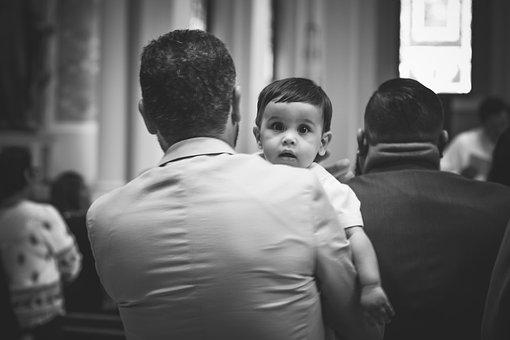How to Get Your Kids to Behave in Church (or any other place, for that matter)
 Learning to behave in church is a process.
Learning to behave in church is a process.
To begin with, we were not pros at getting our kids to behave in church. Let me assure you that we did not have this all together when raising our kids. I will never forgot the glares from other adults, the constant frustration of my kids being “old enough to know better and young enough not to care,” and the disagreements Dave and I had about what could be expected of our kids.
The glares from adults were especially prevalent when we visited churches where a nursery was provided (and expected to be used). We didn’t know the church, the people, or the child care workers and were not going to put our children with strangers. Plus, our kids knew [ha ha] how to behave in church. What was really interesting was the time the church we were attending was in the process of renovating and temporarily had no child care facilities, so all the kiddos stayed in church. Guess whose kids were the best behaved during those services!
Even so, we had our disagreements about our kids and how they should behave in church. You guessed it. I thought Dave was too strict and he thought I was too soft. We were probably both right. I know each child, each situation is different, but every child can learn – and so can every parent.
If your church provides child care and you utilize it, this post probably does not pertain to you. If, however, you are in the throes of parenting kiddos during church, keep reading. Single parents: enlist the help of others. You do not need to do this alone.
Consider the factors
Temperament and age is definitely a factor. Some children are less inquisitive and are willing to sit quietly with little to entertain them. Others are rambunctious and inquisitive (we had one of those and it was not fun). Recognize the differences but do not use them for an excuse. Every child can learn to sit still. Every child. It will be harder for some kids than others, but every child can learn.
The younger the child, the less he understands what is expected of him in a public setting. The less time he has spent in church, the less he understands. Recognize this, but do not make excuses.
When we had foster kids, our 18-month old had a hard time being still because he had never needed to be still. He believed in moving around, making noises, and making faces at folks sitting behind us. He learned. In less than two months, he knew exactly what was expected. His behavior wasn’t perfect by any means, but he knew not to make noise and to stay in the range of our pew.
We allowed him time to adapt because the sanctuary was a new environment for him. You don’t have to pinch or hurt a child, but he can be held tightly enough that squirming only makes him more uncomfortable. He’ll learn to quit fighting and squirming so he doesn’t need to be held in a grip. That’s not too mean or too rough. Our kids knew that a seat on their father’s lap became uncomfortable when they squirmed. Nobody, but nobody wanted to be sent to their Papa’s lap for misbehavior!
Practice at home on how to behave
If you have family devotions, this is a great time for a child to learn to sit still. This will help him understand how he is to behave in church. A toddler is capable of sitting quietly on your lap for a few minutes. When our youngest was about two, we realized his behavior was worse in church than our older kids’ behavior had been.
When I stopped to figure out why, I realized we allowed him to roam around the living room while the rest of us sat still for family devotions. After he had to sit with the rest of the kids during our devotions, he learned to sit still and knew not to travel around in the pew area. My rationale was that he was “so little” and “too young to understand.” Dave reminded me that our older kids learned at that age, and he could, too.
Explain to your kids that this is good practice on how to behave in church. Give applause for the one whose behavior is best during the devotional time. Affirm your kids for doing well and when you see improvement.
Provide “entertainment” for little ones
I know some folks will disagree with me here. Some parents don’t give their children anything to hold or play with during church. Certainly, that’s your prerogative.
We gave our children small toys: tricky dogs, matchbox cars, small notebooks for writing or drawing. These items were used only for church, so having them to play with was special and did not bore easily. [I confess that I made sheets of math problems for our 4-year old that kept him occupied for entire services.]
Once your children are able to write, encourage them to take notes of the sermon so they can ask questions later. Help them follow scripture reading in the Bible you provide for them. Quiz them after church and let them tell you what they heard or learned. If they know there’s a “quiz” of one or two questions, they will pay better attention.
Less is more
Dave never thought the things I took to church for our kids were that necessary – and certainly they did not need as many choices. Giving too many choices only makes kids more restless. They go from toy to toy, never content with what they have. I realize that now, but it certainly was hard to see it then!
Our kids – from 18 months and older – sat on Dave’s lap with only a ball point pen to click open and close, or a pen with a cap to put on and take off. When he tired of that, Dave handed him a different pen or a fingernail clipper he had in his pocket. It never worked for me, but it did for him. You know why? Because Dave expected the child to be content, and he was.
Moms, let your husband be the dad. Do not emasculate him. He’s every bit as much the parent as are you. Let him take the fussy, fidgety child and don’t exude sympathy for your kiddo, because he will feel it. Don’t keep looking at your baby to see how he’s doing. Focus your attention on worship and let your husband be the head of your family; let him deal with the child who belongs to both of you.
If your child wants to sit with someone else, he needs to understand that he won’t move back and forth between you and his aunt or grandparent. He needs to stay in one place. If he wants to come back to you, then he stays. He doesn’t keep going back and forth. When we allow a child to do that, we are allowing him to be in control. He needs to learn to be quiet and not be disruptive to others. This is good practice for classroom behavior in school or Sunday school as well.
We rarely allowed our kids to sit with others because we wanted to be certain they were following our “rules” for church. You can do this however you like, but remember that others are often (not always) more lenient than you. When our young foster son wanted to sit with one of our older kids, we allowed him to do so. But when he decided to come back to us during the service, he had to stay with us. We did not let him keep going back and forth (after we learned the hard way).
Do not sympathize
Children learn quickly who will give them sympathy and feel sorry for them. One day Dave took our three-year-old out during a service. They came back in together, and she still had tears on her face. She was mad at Dave and she reached for me. She wanted her mama.
I learned over and whispered, “When you can give your papa a hug, you can come to me.” For me to take her in my arms implied to her that she did not “deserve” the discipline she received and “deserved” comforting. It would give her a “right” to be mad at him. Her fit in the middle of the service called for action. Her father took her outside to handle the situation. Why should I “comfort” her when what happened was a consequence of her deliberate choice? Out of the corner of my eye, I saw the stares of other moms. I knew they were thinking, “If she wants her mom, she should be allowed to have her!”
By the time our daughter was ready to give her papa a hug so she could come to me, she didn’t need me anymore. Instead, she snuggled in his lap, warmed by his embrace. She knew she was wrong, and she knew he loved her. I firmly believe that my response reinforced to her that we were a team.
Be proactive
When your kids are older, they can pack their own backpack for church. It should include a Bible, notebook, and pen or pencil. When a kid gets his own pack ready, he more readily participates. You can always check the contents if necessary. I used to ask our younger kids what they wanted to take to church. Choosing a favorite match box truck or doll gave the child significance in having a vested interest. Do this the evening before, not the morning of – and save your sanity!
Talk to your kids ahead of time and remind them what is expected. Then follow through; this gives them security.
Remember this: when your child is old enough to be defiant of what you ask of her, she is old enough to receive consequences for her defiance. Share on X When your child keeps resisting you, when he keeps testing you, when he keeps defying what you expect of him, he knows what he is doing.
Do not disappoint him. He needs to know the boundary is there so he can be secure. He needs to hear your affirmation for the things he does right as well.
Think ahead. Plan ahead. Be proactive, and follow through. You can do this.









In my Family we just learned to be still in Church: and there were 8 children. I certainly agree with your point on family devotions:that was time for us to be together with God who was always with us. My Mother had books she’d read to us as small children all about Jesus and how he loved us. I was the 4th child so I wouldn’t remember how my Parents trained the older 3 children. It was so good to know that God was always with us, that we could tell Him anything. We we’re brought up in the Catholic Church. I remember the Children’s Bible my Parents gave to me on Christmas when I was 8 years old! I’m 66 now and that’s a clear memory! We also learned about Protestant denominations too and we’re taught to respect others and their beliefs. It’s still wonderful to know life is eternal: God bless you two Parents who foster Children!